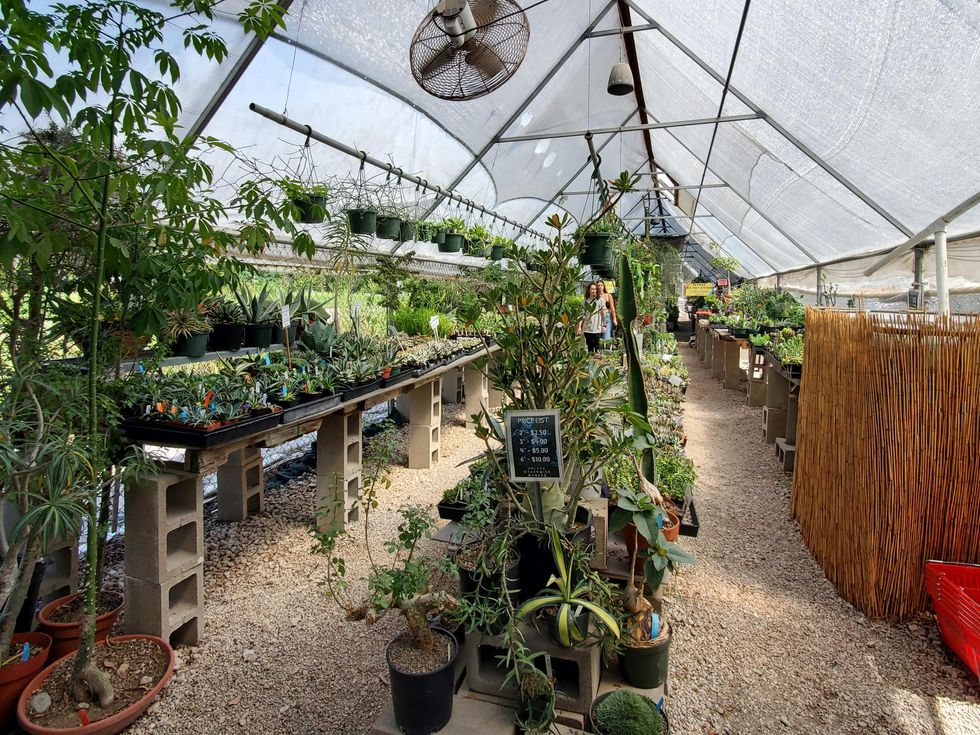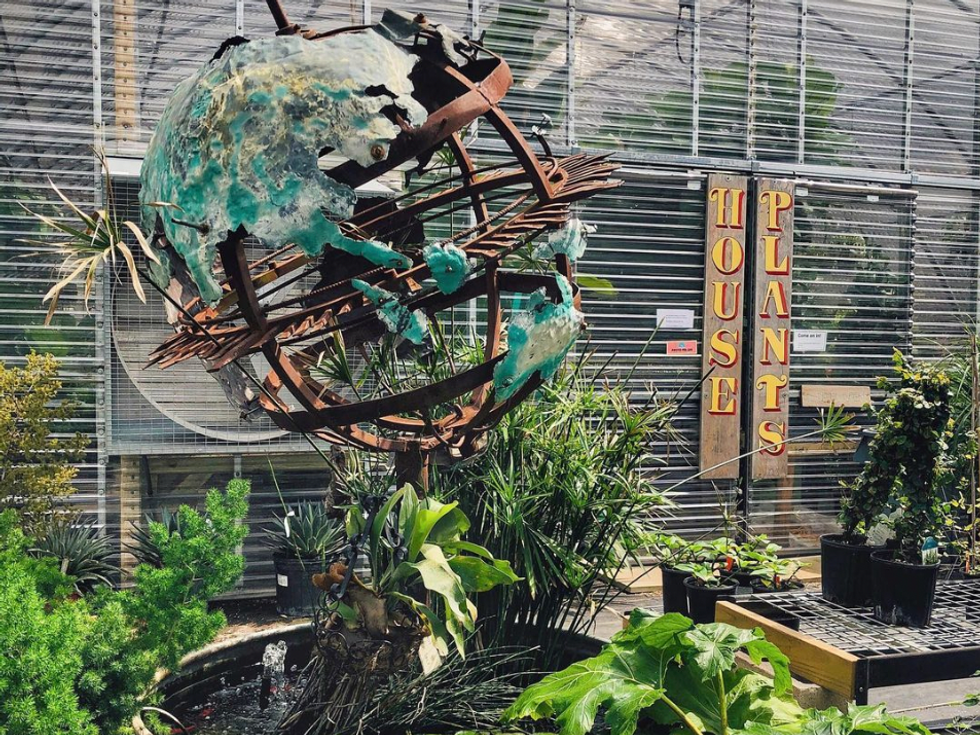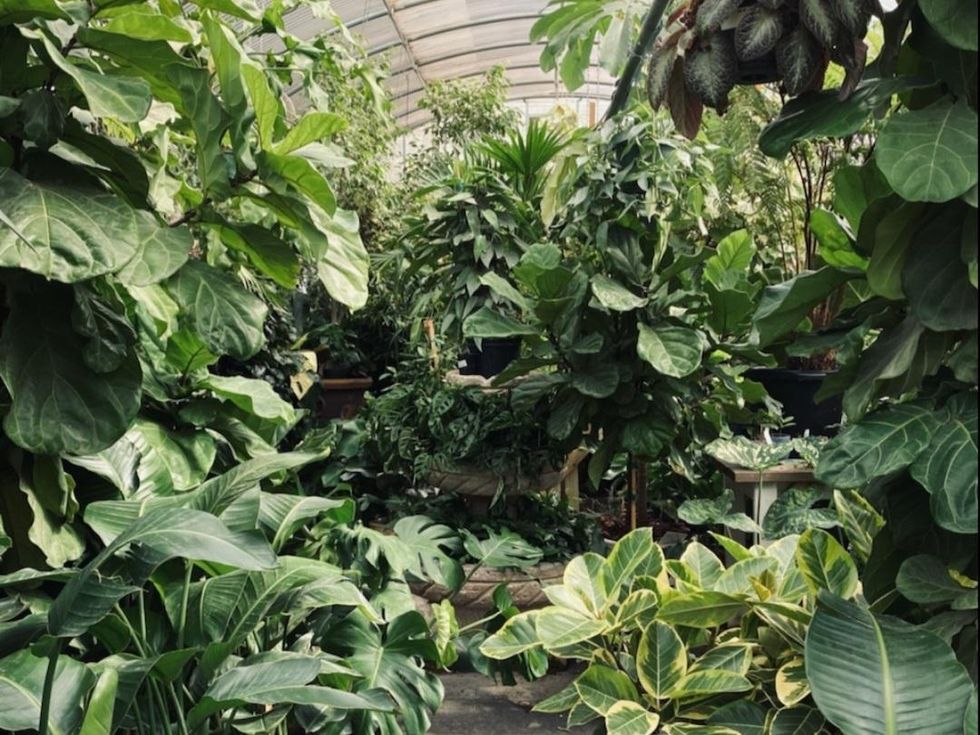Small Business Spotlight
2 Austin plant sellers spend a decade together in neighborhood business symbiosis
When I moved to Austin and started collecting plants, I was vaguely privy to discussions about rare plants. People would post in Facebook groups, “I’ve been looking for this plant everywhere. Can’t believe I finally found it.” Or, “Does anyone know where I can look?” East Austin Succulents, a sandy paradise of water-retaining plants and wacky containers, was the source of my naivety.
I couldn’t believe that a casual plant collector would struggle to find anything but the rarest of plants, because East Austin Succulents — my only reference point — had them all. And some of those really rare ones, too.
The succulent nursery shares a long rectangular lot in a mostly residential area along Boggy Creek with another, equally plant-dense vendor, Tillery Street Plant Company. The two have been allies for twelve years, but the businesses are completely separate: One deals in succulents, and the other in basically everything else.
“There is some overlap, but we try to keep it minimal, and try to help each other out,” says longtime manager Melissa Hagen, calling in from the Tillery Street Plant Company “office,” a tiny travel trailer that lives onsite. The businesses will sometimes swap accidental orders to maintain a logical division of wares. It was not a coincidence two complementary businesses found each other.
“Jon [Hutson, the owner of Tillery Street Plant Company,] sold everything,” reflects East Austin Succulents owner Eric Pedley. Hutson was Pedley’s gateway into the space when the pair decided to share the rent in 2010. “And then it was like, well, you if you're gonna let me in, I have to be all succulents. Tillery does cold-hardy landscaping succulents, also, so I don't sell the cold-hardy stuff. And they don't sell things that are not cold-hardy.”
On the left side of the lot, the succulent shop spreads out like a photosynthetic carnival, with white tents casting diffused bright sunlight over hundreds of fleshy and spiny plants. The main tents line up like rooms in a railroad apartment, whose xerophyte residents range from a few dollars to well over $100. An array of pottery outside is one of the most diverse selections a collector could find across the city, and the team will even drill or hammer drainage holes in customer’s items from home, with few limits and a tiny fee.
Next door, without much indication of a change in business operations, a small house or shed stands beside an arched greenhouse. The latter building's sliding barn doors reveal not just a room full of plants, but a tropical forest with a roof. Tables are barely visible under houseplants and between eight-foot trees. With so little real estate, vining and carnivorous plants hang from the ceiling. It's Austin's most immersive art experience, yet still just a plant store. Inside the house, there’s macrame and indoor plant trinkets everywhere.
Plant shops and the people who talk about them risk emphasizing style and volume over plant health. It is most important, although perhaps least interesting, to note: East Austin Succulents and Tillery Street Plant Company sell irreproachably healthy plants.
About a decade ago, when these businesses started growing their roots only a few months apart, the space was “a co-op type thing” in Pedley’s words — a business trailer park. Hagen adds that the trailer owners “sold all sorts of magical things.” At the time, she was teaching yoga at a sweat lodge on site. “It was very much a community space. At one point, it was all gardens, and then it was [an] event space, and now it's kind of like our landscape.”
Although the two businesses have taken over the entire space, the community spirit prevails. It’d be hard to stifle, when it comes to plants, a major common denominator between basically anyone with their own space and the ability (or at least desire) to keep something alive. “The east side is changing,” says Hagen. “And a lot of people now don't even necessarily have yards; they have condos. [But] everybody has window sills, pretty much.”
It’s no surprise that houseplants experienced a sales boom as the pandemic kept more people at home. Not only did people at home have an incentive to bring the outside in — and the time to tend to something carefully — they had something to talk about. The first two years brought obvious hardship for many businesses, but broke sales records for the succulent shop.
East Austin Succulents social media director and retail manager Sonja Muniz runs with this willingness to engage, posting this-or-that polls that compare unique plants for sale, managing plant auctions, and sharing care tips with a strong, irreverent voice that’s either a charismatic wakeup call, or a vehicle for catharsis for home growers that have been trying to politely explain the issue on their own.
“People like to do games,” says Muniz. “You can only do scrolling so much. This-or-that gets people engaged with the variety of products we have. And it’s also just something fun that even if you don't like plants, you can still pick a plant you like.”
During Winter Storm Uri (the February 2021 “Snowpocalypse”), businesses all over Austin scrambled to minimize damage, turning to social media to check in with supporters and request patience and support. These nurseries barely had solid walls to rely on, let alone the temperatures most plants need to stay alive. Yet, as staff from both businesses hauled plants around to safer conditions and trimmed dead leaves, it somehow looked like they were having a good time.
“Yeah, we have to,” confirms Muniz. “We have a small-knit crew and our nursery was about maybe five of us on the team. So we had to really buckle down. It's kind of working on a ship.”
It wasn’t smooth sailing, but most of both businesses' inventory survived, and the teams took the opportunity to set an example for regular Austinites bringing their own plants back to stability. Comments from the days following the storm are littered with requests for advice. East Austin Succulents accepted texts to the store phone, diagnosing issues and prescribing care. (“We're kind of more like doctors on our social media,” says Muniz, reconsidering her metaphor.)
If all three plant people — Pedley, Hagen, and Muniz — share something with each other, their customers, and the plant world at large, it’s a compulsion to give advice. It’s woven through every conversation and medium. Both businesses are always planning workshops, seed swaps, and other opportunities for Austinites to gather and share experiences in this old neighborhood.
Photo by Brianna Caleri
East Austin Succulents (pictured) and Tillery Street Plant Company have built a small empire of beautiful and healthy plants, for a beautiful and healthy community.



Their top three pieces of advice: buy plants in good soil or repot them right away; let people with experience help you fall in love with the right plants for you; and sometimes things die. We’ve all killed plants, but there are people out there to help each other learn.
“It's just been bit by bit,” says Pedley of his own journey from bewildered non-plant person to a local cactus hero. “Baby steps to, you know … just what we're doing now.”
